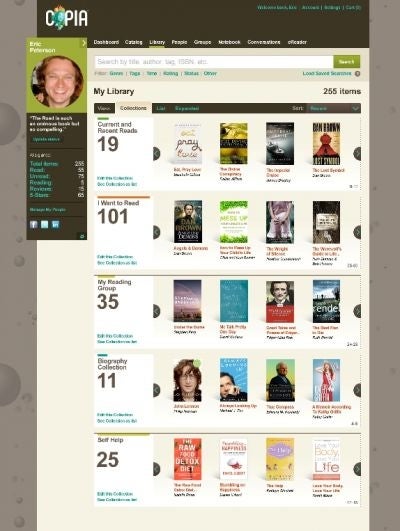Your support helps us to tell the story
From reproductive rights to climate change to Big Tech, The Independent is on the ground when the story is developing. Whether it's investigating the financials of Elon Musk's pro-Trump PAC or producing our latest documentary, 'The A Word', which shines a light on the American women fighting for reproductive rights, we know how important it is to parse out the facts from the messaging.
At such a critical moment in US history, we need reporters on the ground. Your donation allows us to keep sending journalists to speak to both sides of the story.
The Independent is trusted by Americans across the entire political spectrum. And unlike many other quality news outlets, we choose not to lock Americans out of our reporting and analysis with paywalls. We believe quality journalism should be available to everyone, paid for by those who can afford it.
Your support makes all the difference.Three new e-book platforms - Google Editions, Blio, and Copia - are set to make their debut, each offering advantages over current popular services such as Kindle, iBooks, Sony, and Kobo. On August 5, Mike Shatzkin, founder and CEO of the book publishing futurist company Idea Logical, outlined the unique selling points of the new platforms.
The most anticipated of the new platforms is undoubtedly Google Editions, an online bookstore that will link directly to users' Google accounts. Google's cloud-computing model will allow for the sharing of files across any devices that support a browser.
According to Shatzkin, who reviewed the platforms on his Idea Logical blog, Google's advantage is "ubiquity": The tech company has been involved with major publishers throughout the world and is therefore likely to be able to provide an extensive library. "Google has a staggering number - millions - of public domain books," says Shatzkin, "but they will also have professional and scientific books not published on most of the prior ebook platforms."
Google Editions is antipicated to launch by summer's end.
Next in line is Blio, the e-book platform fueled by international book distributor Baker & Taylor and created by futurist Ray Kurzweil. According to Kurzweil, Blio's unique offering is its "enhanced feature sets" - such as a PDF (and soon Quark) format that can be enhanced by publishers - which is expected to create the ideal platform for highly illustrated books that have so far not worked in the digital realm.
Blio was first displayed in December and was originally expected out in February. It is now likely to launch on the Toshiba tablet, due out within the coming months, and the company projects that Blio could be on more than 50 million devices by the end of 2011.
The third of the forthcoming platforms is from Copia, a company that is also set to release a new line of e-readers. Shatzkin cites Copia's approach to "social networking" as its defining feature - specifically, combining that networking "right into the platform in which content purchasing and consumption take place." Notes, recommendations, and other aspects of the reading experience can be easily shared among friends or networks, and existing contacts from Facebook, Twitter, and LinkedIn can be imported into the platform. "This could be critical for reading groups, areas of common (vertical) interest, or for educational applications," says Shatzkin.
Copia is expected to launch in September, when the first of its new e-readers is due out. The company has also announced that it will be a launch partner for the Windows Phone 7, due out by year's end.

Join our commenting forum
Join thought-provoking conversations, follow other Independent readers and see their replies
Comments